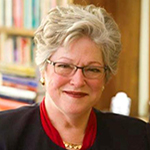By Molly T. Marshall
 What makes possible a visionary such as Martin Luther King Jr.? What sustains the hope of an Aung San Suu Kyi, a Mahatma Gandhi or a Marian Wright Edelman? They envision a different world and then give themselves to bring it about. Somehow their personal experience, humanitarian compassion and God-inspired dream come together to forge a movement that moves in the direction of God’s beloved community.
What makes possible a visionary such as Martin Luther King Jr.? What sustains the hope of an Aung San Suu Kyi, a Mahatma Gandhi or a Marian Wright Edelman? They envision a different world and then give themselves to bring it about. Somehow their personal experience, humanitarian compassion and God-inspired dream come together to forge a movement that moves in the direction of God’s beloved community.
Flawed and faithful, fragile and forthright, these dreamers model for the rest of us what fortitude and focused purpose entail. They become templates for us, and we draw encouragement from their willingness to risk for something they cannot yet see. We also project our hopes on them, for they embody what we are fearful to engage. At times, our cynicism about the possibility of change casts them as hopeless dreamers. We also benefit from systems of injustice, and we dare not get too enthusiastic lest we suffer dislocation ourselves.
We did not celebrate the Martin Luther King Jr. holiday here in Myanmar (Burma) on Monday, yet he is a revered figure and stirs courage in those fomenting a more just society. At the Baptist seminary I regularly frequent, he is a regular topic of lecture and discussion and, no doubt, offers guidance to nonviolent actions here. News came yesterday of a planned student protest in Yangon, which may occur in the next few days.
There has been an uneasy relationship between government and students since the 1960s. Protesting the restrictions to academic freedom, free press and the diminishment of human rights, students have been at the vanguard of social change. Then the government took a drastic action: The University of Yangon was shut down by the military regime, and students were displaced to small schools far from the center of population. You can still see overgrown campuses here in the city, with little signs of life.
My counterpart at Myanmar Institute of Theology, President Samuel Ngun Ling, has a holy dream to build Myanmar Christian University. He envisions a new school that will equip students with the competencies needed for gainful and useful employment in needed sectors. Urgently needed are health care workers, leaders of NGO nonprofits, educators and technicians in wide-ranging fields, to mention only a few in this rapidly expanding nation.
Dr. Ling knows that his vision is bold and will require many collaborating factors. The location will be near a new international airport in the Bago Township, and the pristine land offers the possibility of more ecologically sensitive construction and operation. He has already taken major steps to garner support from the Myanmar Baptist Convention — 18 discrete Baptist bodies, and two churches — a monumental feat in itself! And he is willing to take the long view.
I admire his perseverance and single-minded pursuit of this dream, and I am cheered by his dogged trust that faith will become sight. Providing quality education laced with Christian values is a transformative initiative, and I trust God’s providence will sustain this effort.
How does a person determine what his or her main purpose is? Oftentimes, we expect God to drop from heaven a personal mission statement or strategic plan so that all will be clear for us. Or we expect a treasured mentor to figure it all out for us, which neglects the personal kindling of imagination, a key gift of God’s Spirit. It is more complex than that.
The corporate sector spends a great deal of time and marketing money refining mission, core business and differentiated products. Knowing how to whet the appetites of potential customers, architects of consumerism shape the “wants” to “needs” and thereby succeed in their pursuit of profitable business. Who doesn’t want beautiful, intuitive and ultimate items of attire, technology and premium experiences? Yet, our holy longings outstrip these temporal goods; should we not be as intentional in crafting our dreams?
When Martin Luther King Jr. preached about his dream, the whole world listened because it was not borrowed; it was discerned through reading the Bible, scanning the landscape, enduring the prejudice and claiming the power of intentional actions. It was a holy dream because it looked beyond the present indignities to the promise of full inclusion, the realization of human rights. Recent events remind us that there is more work to be done in service of this dream, and we cannot assume it has been fulfilled — as too many white folks tend to do.
So, what will each of us do with our one precious life? It is the most important question of all. As a theological educator, I long for seminary students to find their particular niche through recognizing the capacities they have to respond to the call of God. Dreaming a holy dream requires gestation; but it will be born, by God’s grace and faithful quest.
